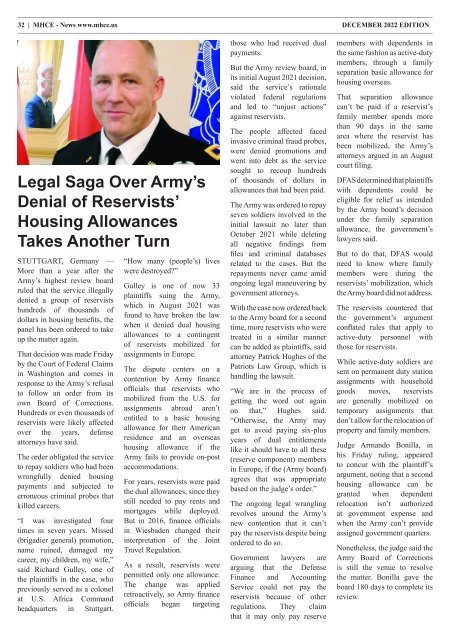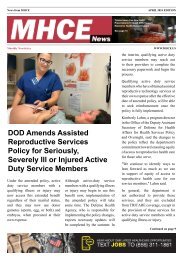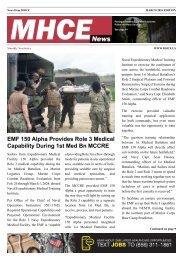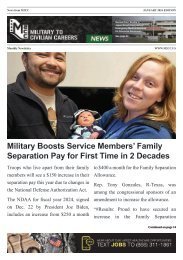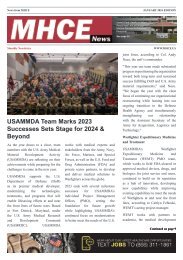December 2022 — MHCE Newsletter
Create successful ePaper yourself
Turn your PDF publications into a flip-book with our unique Google optimized e-Paper software.
32 | <strong>MHCE</strong> - News www.mhce.us DECEMBER <strong>2022</strong> EDITION<br />
Legal Saga Over Army’s<br />
Denial of Reservists’<br />
Housing Allowances<br />
Takes Another Turn<br />
STUTTGART, Germany <strong>—</strong><br />
More than a year after the<br />
Army’s highest review board<br />
ruled that the service illegally<br />
denied a group of reservists<br />
hundreds of thousands of<br />
dollars in housing benefits, the<br />
panel has been ordered to take<br />
up the matter again.<br />
That decision was made Friday<br />
by the Court of Federal Claims<br />
in Washington and comes in<br />
response to the Army’s refusal<br />
to follow an order from its<br />
own Board of Corrections.<br />
Hundreds or even thousands of<br />
reservists were likely affected<br />
over the years, defense<br />
attorneys have said.<br />
The order obligated the service<br />
to repay soldiers who had been<br />
wrongfully denied housing<br />
payments and subjected to<br />
erroneous criminal probes that<br />
killed careers.<br />
“I was investigated four<br />
times in seven years. Missed<br />
(brigadier general) promotion,<br />
name ruined, damaged my<br />
career, my children, my wife,”<br />
said Richard Gulley, one of<br />
the plaintiffs in the case, who<br />
previously served as a colonel<br />
at U.S. Africa Command<br />
headquarters in Stuttgart.<br />
“How many (people’s) lives<br />
were destroyed?”<br />
Gulley is one of now 33<br />
plaintiffs suing the Army,<br />
which in August 2021 was<br />
found to have broken the law<br />
when it denied dual housing<br />
allowances to a contingent<br />
of reservists mobilized for<br />
assignments in Europe.<br />
The dispute centers on a<br />
contention by Army finance<br />
officials that reservists who<br />
mobilized from the U.S. for<br />
assignments abroad aren’t<br />
entitled to a basic housing<br />
allowance for their American<br />
residence and an overseas<br />
housing allowance if the<br />
Army fails to provide on-post<br />
accommodations.<br />
For years, reservists were paid<br />
the dual allowances, since they<br />
still needed to pay rents and<br />
mortgages while deployed.<br />
But in 2016, finance officials<br />
in Wiesbaden changed their<br />
interpretation of the Joint<br />
Travel Regulation.<br />
As a result, reservists were<br />
permitted only one allowance.<br />
The change was applied<br />
retroactively, so Army finance<br />
officials began targeting<br />
those who had received dual<br />
payments.<br />
But the Army review board, in<br />
its initial August 2021 decision,<br />
said the service’s rationale<br />
violated federal regulations<br />
and led to “unjust actions”<br />
against reservists.<br />
The people affected faced<br />
invasive criminal fraud probes,<br />
were denied promotions and<br />
went into debt as the service<br />
sought to recoup hundreds<br />
of thousands of dollars in<br />
allowances that had been paid.<br />
The Army was ordered to repay<br />
seven soldiers involved in the<br />
initial lawsuit no later than<br />
October 2021 while deleting<br />
all negative findings from<br />
files and criminal databases<br />
related to the cases. But the<br />
repayments never came amid<br />
ongoing legal maneuvering by<br />
government attorneys.<br />
With the case now ordered back<br />
to the Army board for a second<br />
time, more reservists who were<br />
treated in a similar manner<br />
can be added as plaintiffs, said<br />
attorney Patrick Hughes of the<br />
Patriots Law Group, which is<br />
handling the lawsuit.<br />
“We are in the process of<br />
getting the word out again<br />
on that,” Hughes said.<br />
“Otherwise, the Army may<br />
get to avoid paying six-plus<br />
years of dual entitlements<br />
like it should have to all these<br />
(reserve component) members<br />
in Europe, if the (Army board)<br />
agrees that was appropriate<br />
based on the judge’s order.”<br />
The ongoing legal wrangling<br />
revolves around the Army’s<br />
new contention that it can’t<br />
pay the reservists despite being<br />
ordered to do so.<br />
Government lawyers are<br />
arguing that the Defense<br />
Finance and Accounting<br />
Service could not pay the<br />
reservists because of other<br />
regulations. They claim<br />
that it may only pay reserve<br />
members with dependents in<br />
the same fashion as active-duty<br />
members, through a family<br />
separation basic allowance for<br />
housing overseas.<br />
That separation allowance<br />
can’t be paid if a reservist’s<br />
family member spends more<br />
than 90 days in the same<br />
area where the reservist has<br />
been mobilized, the Army’s<br />
attorneys argued in an August<br />
court filing.<br />
DFAS determined that plaintiffs<br />
with dependents could be<br />
eligible for relief as intended<br />
by the Army board’s decision<br />
under the family separation<br />
allowance, the government’s<br />
lawyers said.<br />
But to do that, DFAS would<br />
need to know where family<br />
members were during the<br />
reservists’ mobilization, which<br />
the Army board did not address.<br />
The reservists countered that<br />
the government’s argument<br />
conflated rules that apply to<br />
active-duty personnel with<br />
those for reservists.<br />
While active-duty soldiers are<br />
sent on permanent duty station<br />
assignments with household<br />
goods moves, reservists<br />
are generally mobilized on<br />
temporary assignments that<br />
don’t allow for the relocation of<br />
property and family members.<br />
Judge Armando Bonilla, in<br />
his Friday ruling, appeared<br />
to concur with the plaintiff’s<br />
argument, noting that a second<br />
housing allowance can be<br />
granted when dependent<br />
relocation isn’t authorized<br />
at government expense and<br />
when the Army can’t provide<br />
assigned government quarters.<br />
Nonetheless, the judge said the<br />
Army Board of Corrections<br />
is still the venue to resolve<br />
the matter. Bonilla gave the<br />
board 180 days to complete its<br />
review.


